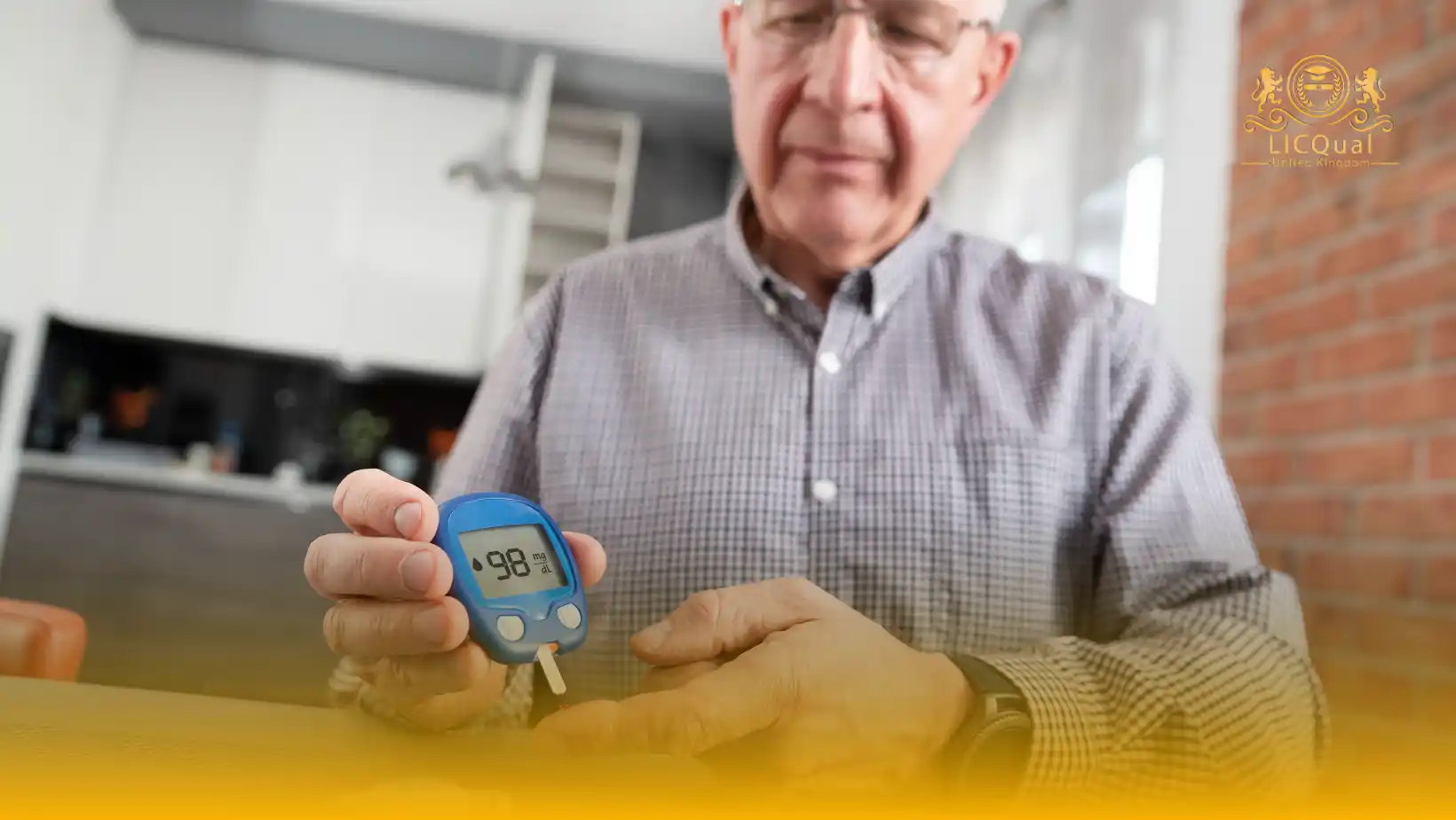The LICQual Level 3 Diploma in Diabetes Management (Dip DM) is a specialized qualification designed for healthcare professionals seeking to advance their knowledge and skills in managing diabetes and related metabolic disorders. This comprehensive programme equips learners with in-depth understanding of diabetes pathophysiology, patient assessment, clinical interventions, lifestyle management, and evidence-based treatment strategies, making it an essential step for those aiming to enhance their professional expertise and career prospects.
This qualification is not intended for fresh candidates. It is specifically tailored for experienced healthcare practitioners, including clinicians, nurses, dietitians, and allied health professionals, who wish to expand their professional competence, improve patient outcomes, and strengthen their Continuing Professional Development (CPD). Learners will engage with structured study units covering the scientific basis of diabetes, pharmacological and non-pharmacological management, patient education, monitoring, and complication prevention, ensuring a thorough and industry-relevant learning experience.
Centres delivering the LICQual Level 3 Diploma in Diabetes Management must maintain the highest standards of education. They are required to have competent and qualified staff, as well as all necessary learning materials, clinical equipment, and resources to facilitate both theoretical and practical training. This ensures learners receive a high-quality educational experience, combining scientific knowledge with practical clinical insight, ultimately supporting learner success and professional growth.
By completing this course, learners will gain advanced knowledge and practical skills that empower them to deliver safe, effective, and evidence-based diabetes care, improve patient management outcomes, and establish themselves as skilled professionals in the field of diabetes management and healthcare practice.
Course Overview
Qualification Title
LICQual Level 3 Diploma in Diabetes Management (Dip DM)
Total Units
6
Total Credits
60
GLH
240
Qualification #
LICQ2200870
Qualification Specification
To enroll in the LICQual Level 3 Diploma in Diabetes Management (Dip DM), applicants must meet the following criteria:
|
Qualification# |
Unit Title |
Credits |
GLH |
|---|---|---|---|
|
LICQ2200870-1 |
Introduction to Diabetes and Its Types |
10 |
40 |
|
LICQ2200870-2 |
Blood Glucose Monitoring and Interpretation |
10 |
40 |
|
LICQ2200870-3 |
Nutrition and Lifestyle Management in Diabetes |
10 |
40 |
|
LICQ2200870-4 |
Pharmacological Management of Diabetes |
10 |
40 |
|
LICQ2200870-5 |
Complications and Co-morbidities of Diabetes |
10 |
40 |
|
LICQ2200870-6 |
Patient Education, Support, and Professional Ethics |
10 |
40 |
By the end of this course, learners will be able to:
Unit 1: Introduction to Diabetes and Its Types
By the end of this unit, learners will be able to:
- Explain the definition, types, and pathophysiology of diabetes mellitus.
- Differentiate between Type 1, Type 2, and gestational diabetes.
- Identify risk factors and global trends in diabetes prevalence.
- Apply international diagnostic criteria to assess diabetes.
- Analyze the impact of diabetes on health and quality of life.
Unit 2: Blood Glucose Monitoring and Interpretation
By the end of this unit, learners will be able to:
- Demonstrate knowledge of blood glucose testing methods, including CGM and self-monitoring.
- Interpret blood glucose readings accurately and identify abnormal patterns.
- Evaluate factors affecting glucose levels and patient outcomes.
- Apply international guidelines to monitor and report glucose levels.
- Develop patient-specific recommendations for glycemic control.
Unit 3: Nutrition and Lifestyle Management in Diabetes
By the end of this unit, learners will be able to:
- Explain the role of nutrition and meal planning in diabetes management.
- Design lifestyle intervention strategies including exercise and behavioral changes.
- Assess the cultural and individual considerations affecting dietary adherence.
- Apply evidence-based international guidelines for dietary management.
- Support patients in adopting and maintaining healthy lifestyle choices.
Unit 4: Pharmacological Management of Diabetes
By the end of this unit, learners will be able to:
- Identify common oral and injectable anti-diabetic medications and their mechanisms of action.
- Evaluate potential side effects and contraindications of diabetes treatments.
- Apply safe practices for insulin therapy, dose adjustment, and combination therapy.
- Integrate pharmacological knowledge into individualized care plans.
- Follow international standards for medication administration in diabetes management.
Unit 5: Complications and Co-morbidities of Diabetes
By the end of this unit, learners will be able to:
- Identify acute and chronic complications of diabetes, including DKA, HHS, cardiovascular, renal, and ocular issues.
- Assess risk factors for developing diabetes-related complications.
- Implement strategies for prevention, early detection, and management of complications.
- Understand the interrelationship between diabetes and other chronic diseases.
- Develop care plans adhering to international standards for complication management.
Unit 6: Patient Education, Support, and Professional Ethics
By the end of this unit, learners will be able to:
- Apply patient-centered communication techniques in diabetes education.
- Develop strategies to support patient self-management and adherence.
- Incorporate culturally sensitive approaches in patient education and care.
- Demonstrate understanding of professional ethics, confidentiality, and responsibilities.
- Engage in continuous professional development to enhance diabetes care practice.
The LICQual Level 3 Diploma in Diabetes Management (Dip DM) is designed for healthcare professionals, clinicians, and aspiring specialists who want to gain accredited expertise in diabetes prevention, treatment, and long-term care. This diabetes management diploma for healthcare professionals is ideal for doctors, nurses, researchers, and students who aim to strengthen their knowledge, improve patient outcomes, and advance their careers in one of the most critical areas of modern healthcare.
1. Medical Doctors and Physicians
- Expand your clinical expertise with accredited diabetes management training.
- Learn evidence-based approaches to diagnosing and treating diabetes.
- Gain skills in managing Type 1, Type 2, and gestational diabetes.
- Strengthen your professional profile with a recognized qualification.
- Stay competitive in the evolving field of chronic disease management.
2. Nurses and Allied Health Professionals
- Acquire practical skills in diabetes education and patient care.
- Support physicians in monitoring and managing diabetic patients.
- Improve career prospects with a CPD-approved qualification.
- Gain confidence in patient communication and lifestyle counseling.
- Build expertise in a high-demand healthcare specialty.
3. Nutritionists and Dietitians
- Learn the role of diet and nutrition in diabetes prevention and control.
- Gain expertise in creating patient-centered dietary plans.
- Understand the impact of lifestyle interventions on blood sugar control.
- Strengthen your practice with evidence-based nutrition strategies.
- Position yourself as a trusted advisor in diabetes care.
4. Pharmacists and Clinical Pharmacologists
- Understand pharmacological treatments for diabetes management.
- Learn about insulin therapy, oral medications, and new drug options.
- Support patients with medication adherence and safety.
- Gain a recognized qualification to enhance professional credibility.
- Collaborate effectively with healthcare teams in diabetes care.
5. Public Health and Healthcare Administrators
- Understand the global impact of diabetes on healthcare systems.
- Gain insights into prevention strategies and policy development.
- Support community-based diabetes education programs.
- Strengthen institutional credibility with accredited staff.
- Promote innovation in chronic disease management.
6. Biomedical and Clinical Researchers
- Deepen your understanding of diabetes pathophysiology and treatment.
- Contribute to research in diabetes care and chronic disease prevention.
- Gain a recognized qualification to support academic publications.
- Collaborate with healthcare institutions on clinical studies.
- Advance your career in medical research and innovation.
7. Students and Aspiring Healthcare Professionals
- Build a strong foundation in diabetes management early in your career.
- Gain a competitive edge when applying for advanced programs.
- Learn from expert-led modules designed for beginners and professionals.
- Acquire knowledge that bridges theory with clinical practice.
- Position yourself for future specialization in diabetes care.
To successfully deliver the LICQual Level 3 Diploma in Diabetes Management, centres must meet the following requirements:
- Qualified and Competent Staff: Tutors and trainers must possess relevant healthcare qualifications and substantial experience in diabetes management and patient care.
- Appropriate Facilities: Centres should provide well-equipped classrooms, practical training areas, and access to medical and learning resources that support both theoretical and hands-on learning.
- Learning Resources: Centres must ensure learners have access to up-to-date textbooks, journals, clinical guidelines, and online learning platforms relevant to diabetes management.
- Health and Safety Compliance: Centres must comply with local and international health and safety regulations to provide a safe learning environment for both learners and staff.
- Assessment and Quality Assurance: Centres should have robust assessment strategies, including practical, theoretical, and portfolio-based evaluations, alongside systems for continuous monitoring and quality improvement.
- Support for Learners: Centres must provide guidance, mentoring, and access to additional learning support to ensure all learners can achieve their qualification.
- CPD and Professional Development: Centres should encourage continuous professional development for staff to maintain high teaching standards aligned with current diabetes care practices.
Meeting these requirements ensures the centre can deliver high-quality education and training, equipping learners with the knowledge and skills necessary to excel in diabetes management.
Assessment and Verification
All units within this qualification are subject to internal assessment by the approved centre and external verification by LICQual. The qualification follows a criterion-referenced assessment approach, ensuring that learners meet all specified learning outcomes.
To achieve a ‘Pass’ in any unit, learners must provide valid, sufficient, and authentic evidence demonstrating their attainment of all learning outcomes and compliance with the prescribed assessment criteria. The Assessor is responsible for evaluating the evidence and determining whether the learner has successfully met the required standards.
Assessors must maintain a clear and comprehensive audit trail, documenting the basis for their assessment decisions to ensure transparency, consistency, and compliance with quality assurance requirements.







